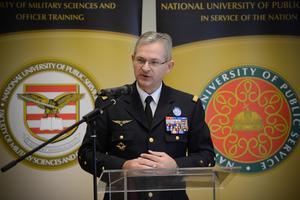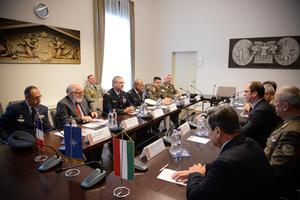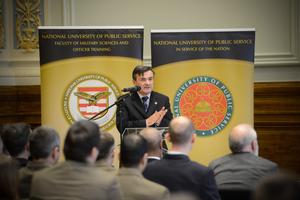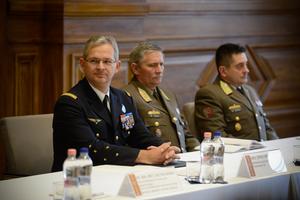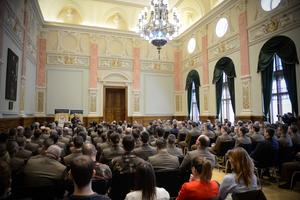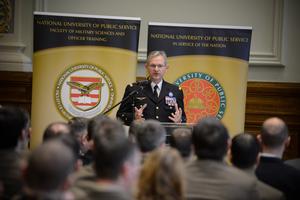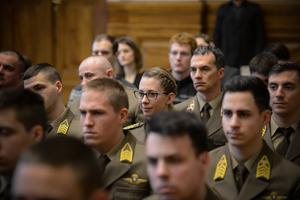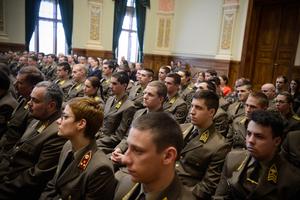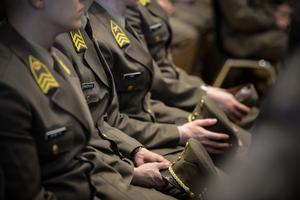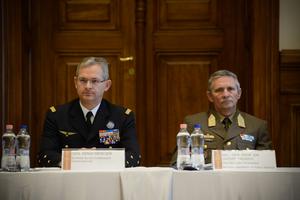Denis Mercier, Supreme Allied Commander Transformation (ACT) of NATO visited the National University of Public Service, as part of his Hungarian visit. On 1 March 2018, the high-ranking officer gave a lecture in the main building’s Széchenyi Assembly Hall at the Ludovika Campus.
The military carrier of Gen. Mercier has started in 1979 when he joined the French Air Force academy. In 1983 he qualified as a fighter pilot and throughout his career he has flown more than 3000 flying hours mostly on Mirage F-1C and Mirage 2000C, including 182 combat missions. He participated in several NATO missions and exercises including, among others, NATO Operation Allied Force in Kosovo in 1999. Later, he served as General of Reims Air Force Base and subsequently as leader of the French Air Force Academy. He also had important roles in the North Atlantic Treaty Organization, and was senior military advisor for the French Minister of Defence. Gen. Mercier became the French Air Force Chief of Staff on 17 September 2012. He has been serving as Supreme Allied Commander Transformation since 23 March 2015.
At the beginning of his lecture - held for a full house in the Széchenyi Assembly Hall - Gen. Mercier expressed his joy of delivering his speech on the adaptibility of NATO in front of so many interested officer candidates. His lecture was started with a short historical overview, in which he highlighted that, although NATO has changed with its environment over the years, its primary role stayed the same.
“Let me underline this fact, by quoting a short passage from the Washington Treaty stating that the parties <are determined to safeguard the freedom, common heritage and civilisation of their peoples, founded on the principles of democracy, individual liberty and the rule of law.> These basic principles have remained unchanged since 1949, and are to remain so nowadays too” - told Gen. Mercier.
On the other hand, he also expressed that unchanged basic principles do not mean that the Organization has not adapted to the changing world. To illustrate this, he went on to showcase the 4 phases NATO has gone through since its foundation. The first phase - between 1949 and 1991 - had been basically about deterence and the Cold War. Then a phase of openess followed between 1991 and 2001, when in the interest of peace, the Organization opened its doors and established new relations both in Europe and all over the World. This fruitful phase was ended by 9-11 in 2001, which made NATO enter into its third phase up until 2014. This era was mostly about crisis management, especially in the case of Afghanistan. The current fourth phase was brought on by the erruption of the Ukranian crisis, which has also brought the fact back to the mind of the general public that threats - from state and non-state actors - could appear at the borders of allied nations.
General Mercier proceeded to continue with the exact definition of this fourth phase, and explained all the threats coming with this age.
“To understand what has changed since 2014, one has to closely examine today’s security environment!” - stressed the speaker the importance of analysis.
In his assessment, he firstly explained that it is vital to see the connection between various crisis situations. Previously, NATO tried to regionalize problems and replied too much on this method. Nowadays, one has to look for solutions on a global scale. As an example, Gen. Mercier mentioned the Baltic region. If here a crisis situation emerges, decision makers cannot think that it is not going to affect the Black Sea region as well.
Secondly, the conncetion between threats was mentioned. Certain state and nonstate actors use different methods depending on the geographical region and the opponent. Thus it is possible that an actor proposes a threat in a region, but the Organization has to work with this same actor in an other region.
The third defining change today is the change of operational environments.
“In the Cold War, we were used to expecting an attack on land, sea or in the air. However, these days we have to take other operational environments into consideration” - explained the speaker.
First of such new environments could be Space, if NATO is to have a peer competitor, equal to its own. The second environment is cyber-space, something that is mentioned more and more nowadays. As far as cyber-space is concerned, General Mercier highlighted that a “state of constant crisis” is the expression that best describes the situation. There is no peace and a constant pressure can be felt. For the third such field, the informational environment around us was defined, something that has close connections to the second environment. Among others, fake news - which is utilized to influence democratic elections - was mentioned in connection to this field, and the situation was described as a “crisis”. As a summary of this section of the talk, the strategic Commander mentioned that it is clear to see that the borders, which had been very clear between peace, crisis and war have been blurred. In the case of an open war, the situation would be much easier, since the enemy could be seen and defeated directly. Unfortunately, that is not the case today, as it can be seen in the hybrid scenarios like in Ukraine.
In the summary of new threats and challenges, Com. Mercier also stressed that it is the easily accessible, powerful information technology that makes these threats possible. As he said, we went from a “complicated 20th century” world into a “complex 21st century” one. In the past, in complicated situations, it was possible to make responsible decisions based on detailed analysis, and these decisions proved to be right in most cases. On the other hand, a complex world means that there are so many unknown factors in the equation that we simply cannot take all of them into consideration. Surprises are more likely than before. They cannot be avoided and the chances of failure are greater. In connection to this, he also expressed that the fear and avoidance of failure is the normal mentality in military cultures, but one must not be afraid of failure, but has to use it as an experience and learn from it. Flexibility is one of the most important characteristics as far as defence and security environments are concerned in the 21st century.
NATO Allied Command Transformation develops and improves the Organization under such circumstance, and the maintenance of partnerships is one of the fields of development. The North Atlantic Treaty Organization, as the name suggests, deals mostly with Europe and North-America, it also has to react to situations in other corners of the planet. Thus, the Organization has more than 40 outside partners all over the world. Furthermore, it also maintains close ties with five countries: Finland, Sweden, Georgia, Jordan and Australia.
The importance of current, open source intelligence collection was a topic also raised by General Mercier. Next to the traditional methods of intelligence gathering, more emphasis should be placed on this, and NATO maintains relations with non-governmental organizations, and naturally with the world of academia as well. They do this in order to predict crisis situations, and try to de-escalate them.
In the following section of the lecture, the speaker reminded the audience of the Warsaw Summit of 2016, where among the guidelines, the improvement of responsiveness was stressed the most. In accordance with this, decision makers have identified two key areas of focus. On the one hand, deterence and defence, and on the other hand the projection of stability. The four Battle Groups of NATO have been deployed as part of this policy.
General Mercier also mentioned the elevation of cyber-space to an operational environment. This process has not been finished yet, but it shows the seriousness of this topic. As far as other defence capabilities were concerned, missile defence - especially defence against ICBMs - also came to the foreground in Warsaw. Finally, the preservation of nuclear deterence was also decided, but only for defence purposes. Internal actions were also supplemented by outside ones, such as initiations of close cooperations, especially with the European Union.
The role of NATO Allied Command Transformation was highlighted in these processes too. It was mentioned that NATO’s structure was found only partially capable to answer the threats of this day and age. Thus ACT submitted a proposal with improvements. High level decision makers accepted the outline of this proposal just three weeks ago in Brussels. Next to the almost compulsary cyber-space sections, the proposal also contains the defence and security of maritime shipping lines over the Atlantic. In the past, this was considered a fundamental role of NATO, but the defence environment following the Cold War did not necessitate this for a while. However, in the case of a peer competition, this defence capability has to be maintained to supply and resupply allied troops in Europe. The improvement of logistical capacities was also one of the many areas in the proposal, but in this case with a land-based, German centre.
In the closing section of this lecture, General Mercier also shared with the audience his inspirations for improvement. It is interesting to note that this inspiration came not from a military environment, but from the processes of American IT and technology cooperations. The flexible, adaptable processes of these companies were taken over and implemented in the field of defence.
“We have to study and understand what “big data”, artifical intelligence and other buzzwords mean for us. We have to consider them not only from a defence point of view, but also see them as opportunities” - told Gen. Mercier.
In his closing remarks, and as a reflection on innovation, the strategic Commander stressed out that an improvement only bears fruit if the human capacities are utilized to the fullest. Human capital has to be raised; human resources have to be trained.
General Mercier left the audience, mostly comprised of officers and officer-cadets, with a valuable food for thought. He quoted General James Mattis, former United States Marines commander, and the current Secretary of Defense of the United States, who - according to his own admission - thought that the basic priciples of war were set in stone, but the threats and challenges of times made even Gen. Mattis realize that there is instability in the field of war in this day and age. General Denis Mercier advised the audience to be always ready for unexpected situations and to be adaptable.
The event concluded with a Q&A session, where the audience could ask the strategic Commander questions.
